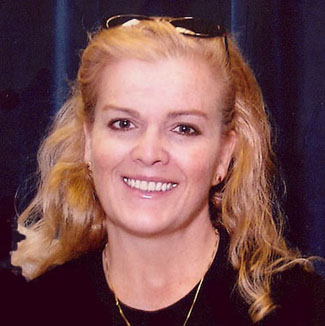
Robin Geist-Wick is pictured in 2006, a year before her death. A jury recently found Stephen Schneider's prescriptions directly led to her death. (Photo use granted by Robert Wick, Robin's widower)
* * * * * *
Special Report, Part 2: Since 2005, Ron Sylvester has led The Wichita Eagle’s coverage of the civil cases and criminal case of “pill mill” doctor Stephen Schneider, and his nurse wife, Linda Schneider. Yet, as iMediaEthics has been reporting, Sylvester has an undisclosed conflict of interest: In none of his 80 reports on the couple and their clinic, who have been charged with links to 68 deaths, does Sylvester disclose that his wife’s law firm represents the Schneiders’ clinic in at least 23 related civil suits. The Schneiders were recently found guilty of most of the 34 counts in the federal criminal case and will soon be sentenced. Part 2 of our report explores the depth of The Wichita Eagle reporter’s continuing conflict of interest. See Part 1 of our special report here. See Part 3 here.
PART 2, STORY HIGHLIGHTS :
|
Robin Geist-Wick, a mom and homemaker, lived to help others, her husband of 17 years says.
Remembered by her widower, Robert Wick, as bubbly and outgoing, Robin Geist-Wick devoted her time and energy to volunteer work throughout the 1990s. He describes how she was devoted to helping unwed pregnant girls at the Bethlehem House in El Dorado, Kan. Anita Hildreth, an employee at the Butler County Safehouse, remembers Robin answered phones and spoke with victims of violence in the early to mid-90s. Hildreth said that she liked Robin and that she remembers Robin “was a very sweet person.”
But in 2007, at age 45, Robin Geist-Wick died from an overdose of medication prescribed for her chronic migraine headaches by Dr. Stephen Schneider, according to both an autopsy and the jury’s decision.
She had started going to the family practice clinic run by Stephen and Linda Schneider in 2004 on a recommendation by a spouse of a relative, her husband said.
To manage the pain of her migraines, which she had suffered since the 1980s, Dr. Schneider prescribed her fentanyl lollipops.
The lollipops, manufactured by Cephalon, are “intended solely for the treatment of breakthrough cancer pain in chronic opioid tolerant cancer patients” and contain fentanyl, an opioid roughly 100 times stronger than morphine.
Wick said his wife was using four of these lollipops a day, as prescribed by Schneider. This meant that she was using about 140 per month, which is four times the recommended safe dosage.
She signed a “pain management agreement” with the clinic on Feb. 3, 2005, that instructed her to have her prescriptions filled only at Dandurand Drugs pharmacy in Wichita. Wick told iMediaEthics that he thought it was strange but Schneider instructed his wife to only use that pharmacy because the doctor and the pharmacist “played golf together.” View the agreement here and here.
The agreement stated at the top that Schneider Medical Clinic “is a family practice clinic; we are not pain management specialists. We believe treating pain is a basic duty of family practice. If your pain is not controlled or want to see a pain specialist we will be happy to refer you to one” (sic).
While the Schneiders presented their Haysville, Kansas clinic as a family practice clinic, it was also referred to as a “pill mill,” because patients were frequently prescribed usually hard to legally obtain controlled medications.
Robin Geist-Wick’s death is only one of the 21 fatalities that the U.S. government charged the Schneiders with being directly responsible for, and one of the total 68 deaths the prosecution said the Schneiders were linked to.
On June 24, 2010, the Schneiders were convicted after a seven-week trial and week long jury deliberation in the 34-count criminal case tried against the couple by assistant U.S. attorneys Tanya Treadway and Alan Metzger in Kansas.
Stephen Schneider, who prescribed the medications, was found guilty of 19 out of 34 counts: He was convicted on one count of conspiracy, five counts of unlawfully dispensing controlled substances, 11 counts of health care fraud, and two counts of money laundering.
Linda Schneider, a practical nurse who ran the clinic, was found guilty of 32 out of 34 counts. She was convicted of one count of conspiracy, five counts of aiding and abetting the unlawful distribution of controlled substances resulting in serious bodily injury or death, 11 counts of health care fraud, and 15 counts of money laundering.
But, that verdict didn’t necessarily bring joy to victims’ families.
“Sixty-eight people didn’t hear that verdict,” medical malpractice attorney Larry Wall told iMediaEthics, referring to the 68 deaths the Schneiders were linked to. Wall represents five families in civil lawsuits pending against Stephen Schneider and Schneider Medical Clinic.
Neither did Robin’s husband, Robert, and his significant other, Denise Zeigler find comfort in the verdict. Zeigler told iMediaEthics by phone that they were at Robin’s gravesite when they got the call that the verdict would be announced soon. They rushed to the courthouse, but were a few minutes late and not allowed in the courtroom.
The jury found Stephen Schneider guilty of illegally dispensing controlled substances to Robin Geist-Wick which resulted in serious bodily injury and her death. The jury hasn’t decided if all 21 deaths are caused by Schneiders, but concluded that ten, including Geist-Wick’s, were caused by the doctor’s actions.
The jury found Linda Schneider guilty of aiding and abetting the illegal dispensing of controlled substances resulting in nine deaths, including Robin Geist-Wick’s. She was also convicted of aiding and abetting the illegal dispensing of controlled substances resulting in serious bodily injury in an additional three cases.
Civil Cases Brought by Victims and Their Families
Since 2005, the Schneiders also have defended themselves against multiple civil lawsuits for medical malpractice that are jointly filed against them and their practice, Schneider Medical Clinic.
See here the list of 23 lawsuits iMediaEthics has newly uncovered in which Hite Fanning attorneys defend Schneider Medical Clinic. The court filings always join the defendants: “Stephen J. Schneider, D.O.; and Schneider Medical Clinic, L.L.C” at the top of the document as well as name their lawyers and law firm defending them.
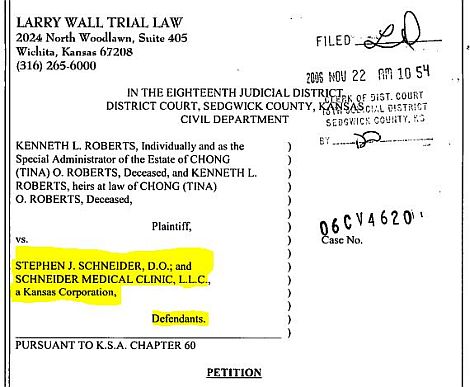 iMediaEthics has reviewed hundreds of court documents from the 18th District Court in Kansas. In all of the lawsuits against the Schneiders, both Stephen Schneider and Schneider Medical Clinic are listed as defendants. Hite Fanning defends Schneider Medical Clinic in 23 civil lawsuits. |
Two of those civil lawsuits against the Schneiders and the clinic come from Robin Geist-Wick’s family.
Her husband, Robert Wick, filed a wrongful death suit against the Schneiders, as did Dallas and Heath Griffon, her two sons from a previous marriage.
Neither Robin nor anyone in her family realized until after her death that she has been prescribed a drug intended for terminal cancer patients, Wick said.
Those lawsuits are pending, as is Wick’s additional lawsuit against Cephalon, the drug company that sells the medication that led to his late wife’s death.
Robert Wick Wondered Why Wichita Eagle Never Called
The voices of Robin Geist-Wick’s husband and two sons have not been heard in the media before.
Robert Wick says that he has never been called or e-mailed by the press about his wife’s death, not even for Sylvester’s June 25 article about the verdict, which began with citing Robin’s case: “Robin G. went to the Schneider Medical Clinic with migraine headaches and received lollipops filled with fentanyl, a drug many times stronger than morphine,” Sylvester wrote.
“I couldn’t believe it…when I saw that” article, Zeigler said.
Why didn’t Sylvester call them for comment, they wondered?
Wick was asked for a comment by a reporter only once. At the courthouse after June 24’s verdict Wick was approached by a journalist and was quoted, but not in The Wichita Eagle.
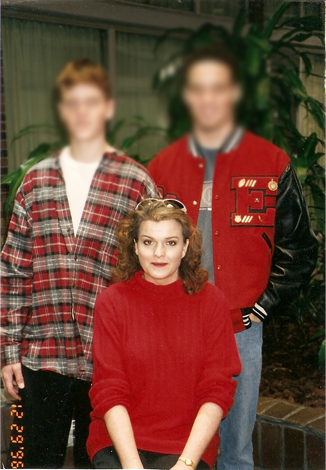 Robin Geist-Wick pictured in 1996 with her two sons, Dallas and Heath Griffon, whose faces iMediaEthics has blurred for privacy . (Photo provided by Robert Wick) |
The Undisclosed Conflict of Interest
The lead reporter on the Schneiders’ saga for the McClatchy Company-owned Wichita Eagle, the largest newspaper in Kansas, is Ron Sylvester, whose byline has appeared on 80 stories about the Schneiders’ case.
Not one of those stories has disclosed the fact that Sylvester’s wife, Gaye Tibbets, is a partner at Hite, Fanning and Honeyman , the law firm defending the Schneiders’ clinic in at least 23 wrongful death lawsuits, including the two by Robin Geist-Wick’s family members. In 68 of Sylvester’s 80 articles, the clinic is mentioned.
Why isn’t it disclosed in any one of these 80 reports – including ones discussing but not naming Hite Fanning civil cases – that his wife’s law firm defends the clinic?
The financial stakes are obvious.
As iMediaEthics previously reported, a freedom of Information request to a Kansas state agency, called Health Care Stabilization Fund, which handles excess insurance coverage for doctors (more below), reveals that Sylvester’s wife’s law firm has generated more than $280,000 from just six of the 23 cases the firm is defending the Schneider clinic.
If only six cases, as Rita Noll, deputy director and chief attorney of the Health Care Stabilization Fund (HCSF), confirms, generated close to $300,000, it wouldn’t be surprising to find that the total billing hours resulting from their 23 cases will exceed one million of dollars in legal fees for Sylvester’s wife’s firm.
Tibbets’ entire law firm is obligated to defend and to attempt to win Schneiders’ cases. That legal advocacy and the perceived financial gain for Tibbets’ partnership interests conflicts with Sylvester’s duty as an unaffiliated reporter with no interest in the outcome of the cases.
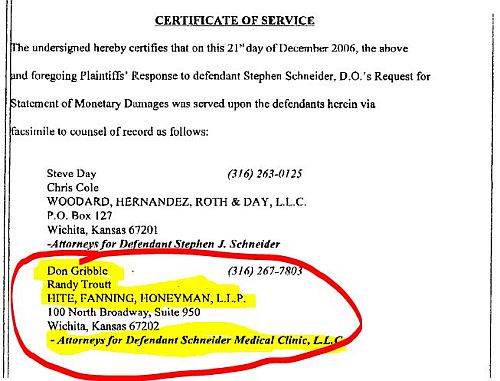 Court documents listed Hite Fanning lawyers as the attorneys for Schneider Medical Clinic in at least 23 civil cases. Five Hite Fanning attorneys’ names appeared throughout the hundreds of court documents iMediaEthics reviewed. |
As the husband of a partner of the Schneider clinic’s legal defense team, Sylvester has an undeniable conflict of interest. Whether Tibbets is the actual lawyer on the case or merely a member of the firm is immaterial to her own legal conflict. While her firm defends Schneiders’ interests, all its members are ethically unable and even legally barred due the conflicts of interests, from representing any one of the wrongful death plaintiffs who are suing the Schneiders.
iMediaEthics also uncovered since our last report that even though Hite Fanning represents the Schneiders’ clinic in the civil cases, Rita Noll, HCSF deputy director and chief attorney, negotiated with Hite Fanning to pay a Hite Fanning partner, Bradley Laforge, $135 an hour for hundreds of hours to attend the criminal trial.
Noll explained that the civil defense team must be paid to participate in the criminal trial and closely work with the criminal defense as these were not separate, but “related interests”–hence why the state of Kansas’ agency would pay Hite Fanning, lawyers for Schneider clinic’s civil case defense, to sit through the entire criminal trial.
Disclosures?
Sylvester, a recent board member on the executive committee of the Society of Professional Journalists, the largest journalist organization in the country, states in his blog’s “about” section that his wife is an attorney but fails to name her firm, Hite Fanning, or mention that she was made partner in Jan. 2009.
(Following the Jan. 12, 2009 announcement in the Wichita Business Journal that identified Tibbets as having been made partner, Sylvester has written 42 out of the 80 articles on the Schneiders.)
Not in the “about” section, nor in any article or tweet on the case, does Sylvester reveal that his wife works for the Schneider clinic defense team firm, Hite Fanning.
Yet she has been with the firm since Sylvester starting his reporting following the 2005 raid of the Schneider clinic. Sylvester and Tibbets were married in Feb. 2005 while she was in the firm..
Documents show that Hite Fanning has at least five out of 19 active lawyers working on the 23 cases for Schneider Medical Clinic–a significant percentage of the firm’s legal team (There are also two “of counsel” lawyers at Hite Fanning).
In addition to Sylvester never mentioning the firm’s name, the five Hite Fanning lawyers working on the case are never named either: associate Gwynne Birzer, partner Don Gribble, partner Jerry Hawkins, partner Bradley Laforge, and partner Randy Troutt.
Because Sylvester doesn’t name his wife’s law firm in his blog’s disclosure and there’s the lack of naming the lawyers or her law firm in 80 articles, there was no way from Sylvester’s reporting for the public to learn about the conflict.
It took a mountain of court documents and hours of research work for iMediaEthics to uncover and document the extent of the cases involved and Hite Fanning’s involvement.
The Eagle blog disclosure promises that Sylvester will “recuse” himself if his wife’s cases “make the news.”
But the Schneider cases have made news in Wichita and nationally, and yet Sylvester did not recuse himself.
National media have reported on the story including a 2007 CBS News report, 2008 reports in Fox News, in 2009 in Forbes, and in 2010, reports in Time and NBC Nightly News.
The code of ethics for the Society of Professional Journalists, for which Sylvester is now a statewide representative and at whose national conference he’s slated to speak in October, advises that journalists “avoid conflicts of interest, real or perceived,” and “disclose unavoidable conflicts.” Such disclosures help maintain the public’s trust.
iMediaEthics’s forthcoming report in this series will feature the Society of Professional Journalists’ response to our complaints about Sylvester’s conflict of interest.
“Shocked” to Hear of Conflict of Interest
Robert Wick said he was “shocked” to learn from iMediaEthics that Sylvester, the Eagle’s journalist reporting on the Schneiders and clinic charged with his wife, Robin’s death, is married to a member of the law firm defending the doctor’s interests. (iMediaEthics was first to report on this undisclosed conflict of interest May 25).
But then, not even the two lawyers – Gary Patterson and Andrew Hutton – suing the doctor and clinic for Robin’s family were aware of Sylvester’s conflict of interest until contacted by iMediaEthics . iMediaEthics spoke to both lawyers by phone.
Wick felt that Sylvester’s articles should alert him and other readers that Sylvester is married to a member of the defense team law firm. How else would Wick and Zeigler know if it weren’t disclosed in the articles?
|
The Health Care Stabilization Fund (HCSF) The Health Care Stabilization Fund (HCSF) is a state agency that provides Kansas doctors with insurance for claims in excess of their private coverage. A May 20 response to a Freedom of Information requests show that Hite, Fanning & Honeyman billed HCSF $283,761.00 in hours spent in 6 Schneider cases, so far. Rita Noll, deputy director and chief attorney of the HCSF, explained that after private insurance has paid out its annual limit in claims, doctors are covered by the fund for excess claims up to $800,000 per case, up to a maximum payment of $2.4 million per doctor, per year. Noll said legal fees fall outside the $2.4 million annual limit. HCSF is entirely self-funded by doctors’ fees and uses no tax payer monies to run its annual operation, Noll said. |
iMediaEthics contacted all of the Wichita television stations that produce news and none of the numerous individuals we spoke to were aware of Sylvester’s conflict of interest. Cayle Thompson, KAKE ABC-affiliate Channel 10 television reporter, who was one of the three journalists live tweeting from the Schneider courtroom, told iMediaEthics that he knew Sylvester was married to a lawyer, but not that Sylvester’s lawyer wife worked for a Schneider defense team firm.
No Humanization of 68 Victims
While his apparent conflict of interest casts doubts on the neutrality of Sylvester’s reporting, it does not necessarily mean that his approach is biased. However, iMediaEthics’ review of Sylvester’s 80 articles on the Schneider case turns up what can be fairly described as a glaring – and odd – lack of victims’ family’s interviews and resulting quotes.
iMediaEthics’ study of Sylvester’s articles, in fact, found only two stories where the families of victims were interviewed. And moreover, iMediaEthics found that the quotes are hardly sympathetic or representative of tragedy felt by the victims’ side.
In an early Eagle’s Sept. 18, 2005 article, co-authored by Sylvester with Dion Lefler and Phyllis Jacobs Griekspoor, family members are interviewed.
In that article, Darrell Hicks, whose 24-year-old son Darrell Hicks III died of an overdose in 2004, says that his son had been prescribed 180 Lortab pills and 120 Soma (muscle relaxer) pills a month. Hicks is quoted as blaming both his son and Dr. Schneider for his son’s death.
In a Dec. 21, 2007 article, Sylvester wrote about the Schneiders appearing in court to face their criminal indictment.
Sylvester briefly quoted Hicks again as saying the indictment was “way overdue.”
Sylvester also interviewed a widow, Patty Hambelton, whose husband Jeff died of an overdose. “When we learned about the large number of deaths associated with the clinic’s practice we decided to make public the cause of Jeff’s tragic death,” Hambelton is quoted as saying.
That’s it for the victims’ interviews in 80 reports (2005-2010).
In contrast, an April 25, 2008 article by Sylvester quotes the two adopted teenage daughters of the Schneiders talking warmly about their eagerness over their father’s forthcoming April release from jail.
The article paints a touching picture of a loving family reunion: The daughters said they left up their Christmas decorations and were saving their Christmas presents until both parents were released.
But where are such touching holiday scenes involving the families of the victims? Sylvester declines to tell the human-interest stories of the 68 alleged victims’ families in his 80 reports.
It’s difficult to believe that the 68 families weren’t willing to talk considering the first family iMediaEthics contacted was more than willing and quickly sent private family photos.
Robert Wick, for instance, testified, attended the trial and went in to hear the jury’s verdict.
He also went to the Wichita Eagle’s Web site June 10 to comment on Sylvester’s article about his mother-in-law’s testimony. (Surprisingly, Robin’s mother, Phyllis Rowland, testified for the defense as the last witness during the criminal trial . Sylvester’s article doesn’t mention Robert Wick’s lawsuit or the context of a mother testifying against her daughter’s heirs interests. More on this later.)
Wick was annoyed that his tame comment was removed from the website and replaced with a note saying that it violated terms of service. But, in the meantime, iMediaEthics notes that comments on other articles of Sylvester’s about the Schneider case compared Schneider to a “Nazi” and also called a drug addiction expert “worthless trash.” Those comments apparently didn’t violate Wichita Eagle’s terms of service, so why did Wick’s?
Undeterred, Wick left a second comment on Sylvester’s article that featured his mother-in-law’s testimony and complained that his first comment had been removed.
See for yourself. Here is is Wick’s comment The Eagle deleted :
“Phyllis you claim to be an intelligent person. I just don’t understand how you can defend Dr. Schneider as he is the reason why Robin is not here today. I am sure she wanted life as she would have loved to have more time with you, her sons, grandchildren and her loving husband. May Robin forgive you for defending the person who was responsible for taking her life.”
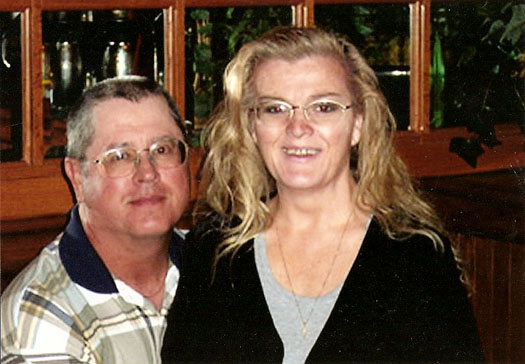 Robert and Robin, photographed together sometime during 2006 to 2007. (Photo provided by Robert Wick) |
Why did Robin’s mother testify against her grandchildrens’ interests?
The criminal defense team’s dramatic last witness for the criminal trial was Phyllis Rowland, Robin’s mom and Robert’s mother-in-law.
Sylvester’s June 10 report was titled the “Mother of patient who overdosed defends Schneiders.” Unlike the Associated Press, Sylvester doesn’t identify who that patient is in his report.
The June 10 Associated Press article identified Robin Geist-Wick as Rowland’s daughter and further mentions that Robin’s husband is suing the Schneiders.
Sylvester does not mention these important newsworthy facts nor that those two lawsuits filed by Robin’s husband and two sons are two of those 23 civil cases that Sylvester’s wife’s firm works on.
Isn’t the news peg: “Why is the grandmother testifying for the defense while her grandchildren sue the defense?” Sylvester left unquestioned why Rowland would consent to being used against her son-in-law and grandson’s legal interests.
The obvious step would have been to contact Robert Wick or Phyllis Rowland to at least get a comment as to why Robin’s husband and sons are suing Schneider, whereas Robin’s mother is defending him in trial regarding her daughter’s death.
So iMediaEthics contacted Wick and Rowland to ask.
Wick told us he was devastated that his almost 80-year-old former mother-in-law testified against his and his stepsons’, Heath and Dallas, interests.
“She was really close to her mom and that’s what’s so shocking – that her mom, you know, testified on the doctor’s behalf,” Zeigler said.
Rowland told iMediaEthics that she testified for the defense because she believes Schneider helped Robin. She wrote she doesn’t think the civil cases brought by her son-in-law and two grandsons are in Robin’s interest.
She wrote in an e-mail to iMediaEthics:
“I was upset by the KBI’s visit after her death because the man seemed to be on a witch hunt for the Schneiders. I felt the same about the autopsy. I think they only looked until they found fentanyl in her body. That was all they wanted to find. If Robin’s death was caused by fentanyl, it was not because Dr. Schneider prescribed it incorrectly. She had successfully taken his prescribed amount for over two years. If she overdosed, it was not the fault of the doctor.”
iMediaEthics asked Rowland for her reaction to the Schneiders being found guilty. Rowland wrote that she is “sorry” the Schneiders were convicted “based on [her] experience and knowledge of Robin’s treatment.” When iMediaEthics asked Rowland about Sylvester’s coverage of the Schneider case, Rowland responded that she hasn’t found The Wichita Eagle’s reporting to be slanted in favor of the defense, but that she didn’t pay attention to the reporters names when following the Schneiders’ case in the news media.
The Schneiders’ Aftermath
The Schneiders were taken into custody by U.S. marshals immediately following the conviction and are awaiting sentencing.
Hite Fanning is still continuing to represent the clinic in at least seven civil cases–that include Wick and his stepsons’ cases–still pending against the couple and their clinic.
The criminal convictions undoubtedly help Robert Wick and his stepsons, Dallas and Heath, in their civil lawsuits.
Several years before Robin died, the fiancé of Denise Zeigler also died unexpectedly in a construction accident. Robert Wick and Denise Ziegler, who had been family friends, started a relationship.
Wick and Ziegler made the roughly 45-minute drive to the court to attend the federal trial of Stephen and Linda Schneider several times during the seven-week trial.
When they originally heard that Robin’s mother would be testifying for the defense, they planned to go to court that day, but said that because the witness schedule kept getting rearranged, they were unable to go.
Since Robin was very close with her mother, Wick and Zeigler told iMediaEthics they could not understand why she was testifying on behalf of the defense. Wick said Robin’s siblings and her mother supported the Schneiders. Note: Robin’s siblings and mother do not have legal standing to be plaintiffs in the civil lawsuits and therefore could not benefit from them. Robin’s sons’ lawyer, Andrew Hutton, said he was unaware that Rowland testified for the defense and that he would reach out to her sons and ask them to contact iMediaEthics. We also attempted to contact Robin’s sons by phone and email but did not receive a response.
When they went to the court to hear the closing arguments, Ziegler said the courtroom was packed. “You had to scramble to get a seat,” she said, remembering that victims’ families were saving each other’s seats if someone had to step out of the room for a minute.
With the criminal trial behind them, Ziegler says it’s another load off their shoulders.
Robert Wick did not have a voice in the media, but he will speak at the sentencing in his victim’s impact statement .
United in their grief over their lost partners, the couple continues to make regular visits to maintain each other’s loved ones’ graves, and place flowers on the sites.
They say they’re now reviewing The Wichita Eagle coverage in light of knowledge of Sylvester’s conflict of interest.
“The Wichita Eagle should have never given Ron Sylvester the assignment of covering this case,” Robert and Denise wrote in an e-mail to iMediaEthics. “Since, his wife is on the defense side, it is a conflict of interest.”
Since there still is no public disclosure of Sylvester’s conflict of interest by The Eagle or Sylvester, the other 67 families may also be in the dark, left trusting a reporter who still refuses to reveal his hidden relationship to the defense.
iMediaEthics attempted again to contact Sylvester and The Wichita Eagle June 25 and still has not had a response. iMediaEthics copied the press contact for McClatchy and the publisher of The Wichita Eagle with that e-mail.
Interestingly, a week after iMediaEthics again contacted The Wichita Eagle and Sylvester to let them know we would be publishing this report soon with two more reports on the way, Sylvester featured an unrelated disclosure of conflict of interest on his blog.
On July 3, Sylvester both blogged and tweeted that he wrote a story about the Wichita Thunder hockey team for the newspaper. In the blog post, Sylvester discloses that his wife, Gaye Tibbets, had sued the Thunder in 2003, before their 2005 marriage. Sylvester wrote that his editors “determined there was no conflict of interest” in his reporting on the Thunder July 3. In his blog, Sylvester links to the print story, which was published on The Wichita Eagle‘s website July 3.
There may be links between the blog post with its disclosure and the online Eagle story, but there is no disclosure in the actual print story itself that appears on the Eagle’s website.*
Sylvester’s July 3 online disclosure indicates that a process is in place where The Eagle editors judge whether there are conflicts of interest in Sylvester’s work. So why didn’t The Eagle or Sylvester inform iMediaEthics or his readers that The Eagle had “determined there was no conflict of interest” in the Schneider case? And further, why didn’t Sylvester blog and tweet, like on July 3, about his wife’s connection to the Schneider case? The answer may be that the Schneider case involves 80 reports going back to 2005, not just one July 3 article.
We will be publishing Part 3 of our ongoing investigation in the near future.
Contributions to this report made by Rhonda Roland Shearer.
*We assume that the articles on The Wichita Eagle’s website when not marked “web exclusive” appeared in the print version of the newspaper.






Comments Terms and Conditions